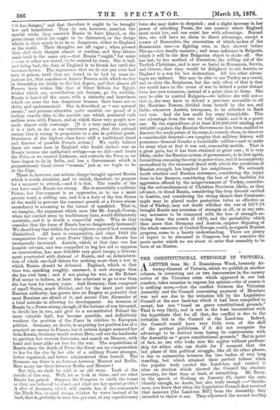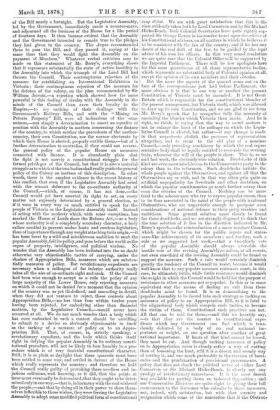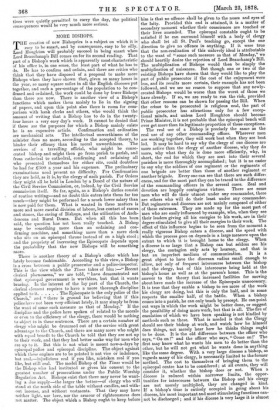THE CONSTITUTIONAL STRUGGLE IN VICTORIA.
ALETTER from Mr. J. Dennistoun Wood, formerly At- torney-General of Victoria, which we publish in another column, in correcting one or two inaccuracies in the cursory notice of the Victorian crisis which appeared in our last number, takes occasion to express his opinion—for of course it is nothing more,—that the conflict between the Victorian Assembly and the Council concerning payment of Members was not one due to the irritation felt by the Legislative Council at the new land-tax which it had been compelled to accept, but was " based on grave constitutional grounds." That is very likely, and is not in the least inconsistent with the hypothesis that for all that, the conflict is due to the irritation felt in the Council at the Land-tax. Indeed, the Council would have very little even of the skill of the pettiest politicians, if it did not recognise the advantage to be derived from basing its controversies with the Assembly on " grave constitutional grounds." But in point of fact, no one who looks into the matter without partisan- ship for either side, can doubt for a moment that the last phase of this political struggle, like all its other phases, is due to animosities between the two bodies of very long standing, but which attained their perfect fulness when the popular body carried the Land-tax, and carried it after an election which showed the Council the absolute necessity, for that time at least, of submitting. Mr. Berry, in his speech at Geelong on January 21, states the case, bluntly enough, no doubt, but also truly enough :—" Gentle- men, you know that when the Legislative Council first received that measure [the Land-tax Bill] from the Assembly, they intended to throw it out. They adjourned the second reading of the Bill nearly a fortnight. But the Legislative Assembly, led by the Government, immediately made a counter-move, and adjourned all the business of the House for a like period of fourteen days. It then became evident that the Assembly and the Government intended to remain true to the pledges they had given to the country. The Argus recommended them to pass the Bill, and they passed it, saying at the same time that they would fight the Assembly on the payment of Members." Whatever verbal criticism may be made on this statement of Mr. Berry's, everything shows that it represents substantially the state of active hostility to the Assembly into which the triumph of the Land Bill had thrown the Council. Their contemptuous rejection of the measure for establishing an International Exhibition iu Victoria ; their contemptuous -rejection of the measure for the defence of the colony, on the plan recommended by Sir William Jervois,—a rejection which showed how far more powerful is this feeling of rivalry with the Assembly in the minds of the Council than even their loyalty to the Empire,—to say nothing of their dealings with the Government's Railway Bills, and with the " Mining on Private Property " Bill, were all indications of the same animus,—not simply a determination to assert an equality of position with the Assembly in matters concerning the finance of the country, to which neither the precedents of the mother- country, their own Constitution, nor the narrow electorate by which their House is elected, properly entitle them,—but of a further determination to neutralise, if they could not reverse, the general policy of the popular House on measures connected with finance. It is abundantly plain that the fight is not merely a constitutional struggle for the formal privileges of the Council, but that it is also a material struggle as to which of the two bodies shall really guide the general policy of the Colony on matters of this description. In other words, there is the amplest evidence in the recent history of this conflict, that even if the Legislative Assembly had acted with the utmost deference to the co-ordinate authority of the Council,—which, of course, it has not done,—the Council would yet have asserted its right to act, on every matter not expressly determined by a general election, as if it were in every way as much entitled to speak for the people of Victoria as the Legislative Assembly itself. Instead of acting with the modesty which, with some exceptions, has marked the House of Lords since the Reform Act,—as a body whose authority is of a completely secondary character, a body rather needful to prevent undue haste and careless legislation, than of importance through any weight attachingto its origin,—it has been beset by a wild and mischievous ambition to snub the popular Assembly, foil its policy, and pose before the world as the organ of property, intelligence, and political wisdom. No wonder that the Assembly has been irritated into the no doubt otherwise very objectionable tactics of carrying, under the shadow of Appropriation Bills, measures which are substan- tially measures of policy. But revolutionary expedients are necessary when a colleague of far inferior authority really takes all the airs of co-ordinate right and rank. If the Council had been wise enough to accept as a rule the policy of any large majority of the Lower House, only rejecting measures on which it could not be denied for a moment that the opinion of the country was as yet ill-defined, and amending in detail, when they did not venture to reject, these contests about Appropriation Bills,—no less than four within twelve years having been rejected, for embodying other than financial matters, by the Legislative Council,—would never have occurred at all. We do not much wonder that a body which has once embarked in such a contest should be unwilling to submit to a device so obviously objectionable in itself 'as the tacking of a measure of policy on to an Appro- priation Bill. That, of course, is, strictly speaking, a revolutionary expedient, and the body which thinks itself right in defying the popular Assembly in its ordinary consti- tutional procedure, will not be likely to bow humbly to a pro- cedure which is of very doubtful constitutional character. Still, it is as plain as daylight that these quarrels must have been settled in some way, and settled in favour of the House which really represents the country ; and therefore we hold the Council really guilty of provoking these needless and in- jurious collisions, well knowing, as it did, that the points at issue must eventually be determined, that they ought to be deter- mined only in one way,—that is, in harmony with the real wishes of the people,—and that by doing all in their power to show them- selves inflexible to those wishes, they were forcing the Legislative Assembly to adopt some modified political form of constitutional coup d'e'tat. We see with great satisfaction that this is the view evidently taken both by Lord Carnarvon and by Sir Michael Hicks-Beach. Both Colonial Secretaries have quite rightly sup- ported Sir George Bowen in his resolve to act upon the advice of his Constitutional advisers, on all matters in which he believes it to be consistent with the law of the country, and if he has any doubt of the real drift of the law, to be guided by the legal advice of his own law officers. In that very sound resolution we are quite sure that the Colonial Office will be supported by the Imperial Parliament. There will be few apologists here for this most quarrelsome of all sham representative bodies, which represents no substantial body of Colonial opinion at all, except the opinion of its own members and their coteries.
But the more the aspects of the quarrel come out on the face of the correspondence just laid before Parliament, the more obvious it is that in one way or another the present Constitution of Victoria must be amended. It is not Great Britain which is responsible for the constitutional blunder of the present arrangement, but Victoria itself, which was allowed to draw up its own Constitution, and we are glad to see from Mr. Berry's speech that he recognites fully the necessity of amending the blunder which Victoria then made. And he is right, we think, in saying that the way to mend matters is not to enlarge the basis of the suffrage on which the Legis- lative Council is elected, but rather—if any change is made in that respect—to abolish the pretence of representation altogether, and to recur to the old plan of a nominee Council,—only providing machinery by which the real repre- sentative body shall be legally entitled to over-ride the revising body, whenever the will of the people is clear. This is, as we said last week, the obviously wise solution. Dead-locks of this kind are even more mischievous to the Conservative party in the colony than to the reformers. Such dead-locks irritate the whole people against the Obstructives, and against all that the Obstructives say or wish, and in that way often gain quite an artificial unpopularity for free-trade and other doctrines, on which the popular constituencies go much further astray than even the coteries of the Council. Nothing can be more fatal to the soberer men who try to expose popular errors, than to be thus associated in the mind of the people with irrational Obstructives, who are unpatriotic enough to postpone even considerations of national defence to their petty rivalries and ambitions. Some general solution must clearly be found for these dead-locks, and we are strongly disposed to think that the true solution of it lies in the direction indicated in Mr. Berry's speech,—the reintroduction of a mere nominee Council, which might be chosen for the public repute and states- man-like achievements of its members ; and further, such a rule as we suggested last week,—that a two-thirds vote of the popular Assembly should always ever-ride the hostile vote of the revising Assembly,—unless, at all events, not even one-third of the revising Assembly could be found to support the measure. Such a rule would certainly diminish greatly the tendency of the Council to resist, because it would well know that to any popular measure resistance must, in this case, be ultimately futile, while futile resistance would diminish the weight in which the Council would be held for the purpose of resistance to other measures not so popular. In this or in some equivalent way the means of finding an exit from these dead-locks must be found. It is as demoralising to the popular Assembly to he forced into such strategy as tacking on measures of policy to an Appropriation Bill, as it is fatal to the oligarchical body which compels such tactics, to become the victim of them. Constitutional such practices are not. All that can be said for them,—and this we heartily say, —is that they are the nearest to constitutional expe- dients which any Government can find which is tena- ciously defeated by a body of no real national im- portance or weight, on one question after another of great national importance. If knots of that kind cannot be loosed, they must be cut. And though tacking measures of policy on to Appropriation votes is clearly rather a way of cutting than of loosening the knot, still it is a decent and seemly way of cutting it, and one much preferable to the erection of barri- cades and the proclamation of provisional governments. A policy that does not shock the political nerve of either Lord Carnarvon or Sir Michael Hicks-Beach, is clearly not any prodigy of revolutionary earnestness. It is the most decent way available for putting down an indecent Opposition ; and our Conservative Ministers are quite right in giving their full countenance to the Governor who submits to these measures, not, indeed, with satisfaction, but with that serenity and resignation which come of the conviction that if the Obstruc. tives were quietly permitted to carry the day, the political consequences would be very much more serious.




































 Previous page
Previous page